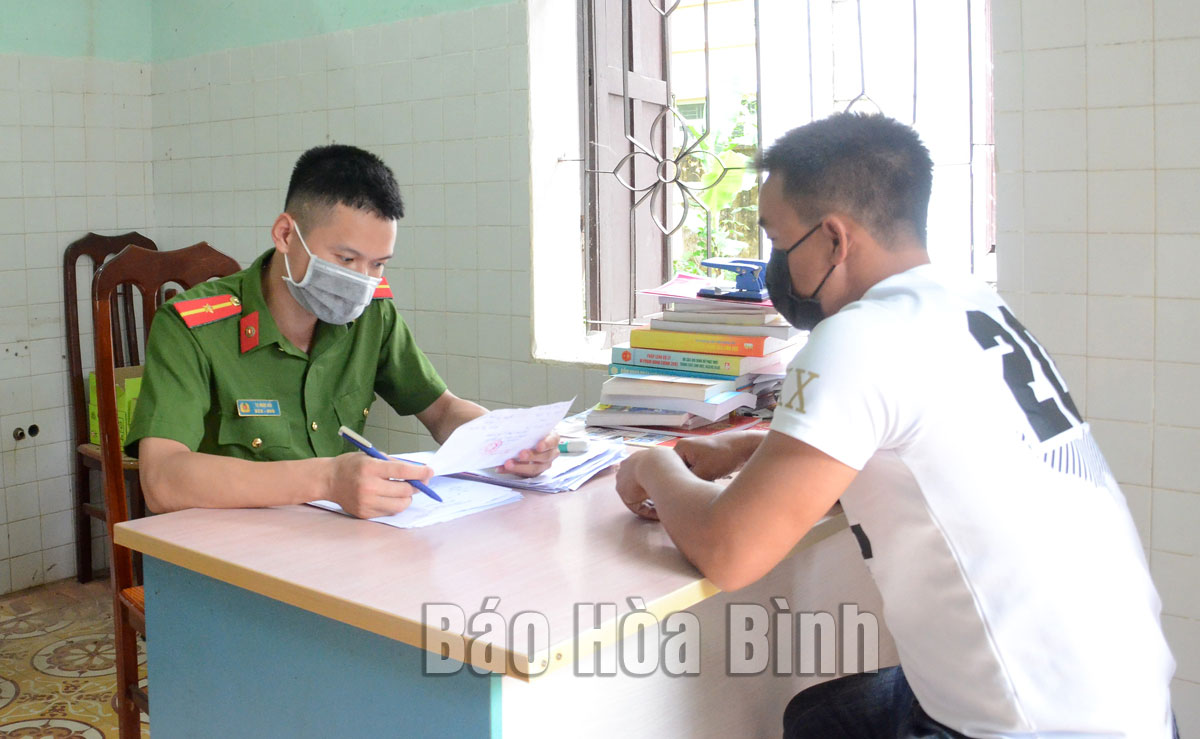
(HBO) – Managing activities in the field of information and communications, relevant agencies in Hoa Binh province have found some people taking advantage of the internet to spread wrong information and conduct sabotage.
Photo: A police officer of Luong Son district questions a man
who spread fake news about the local COVID-19 situation on social media.
Recently, authorities discovered Nguyen Van
Nghiem (born in 1963, living in Phuong Lam ward of Hoa Binh city) opening,
managing, and using many accounts on social media to post and share articles
and videos showing his personal viewpoints. They included 31 videos that
distorted and defamed the people’s administration, which stirred public concern
with anti-State purposes.
Meanwhile, Can Thi Theu and her sons, Trinh Ba
Tu (residing in Ngoc Luong commune of Yen Thuy district with her) and Trinh Ba
Phuong (residing in Hanoi’s Ha Dong district) used their personal Facebook
accounts to post many videos distorting and defaming the people’s
administration and disseminating fabrications.
Talking about this issue, Hoang Manh Cuong,
Deputy Director of the provincial Department of Information and Communications,
said information on the internet, especially social networks, are huge, easy to
access, and updated quickly. However, real information is currently mixed with
fake and unverified one, much of which incites internet users to engage in
violence and drives a wedge into the national solidarity.
Preliminary statistics show that there are more
than 150,000 social network accounts in Hoa Binh province at present, mostly on
Facebook, Zalo, and Youtube. Among them, many published posts about political
and social issues that included negative personal viewpoints and comments
running counter to the Party and State’s polices and laws. They also posted
video clips distorting and defaming leaders and the Party’s reform policy. A
number of such internet users have been detected, warned, and dealt with by
authorities.
Cuong noted to prevent the abuse of cyberspace
against the Party and State, the Department of Information and Communications
has advised the provincial People’s Committee about many counter-measures,
which have initially resulted in encouraging outcomes. In particular, it has
proposed the issuance of documents on managing, controlling, and orienting
information on social networks, managed the use of internet services and online
information, issued an implementation plan for a project on enhancing the
cybercrime combat, applied IT solutions to discover fake and hazardous
information, and carried out a project on the pilot establishment of an
integrated operations centre.
He added that all-level authorities, sectors,
media agencies, and the entire political system need to push ahead with
communications to raise public awareness of the Party and State’s policies and
laws on cybersecurity; strongly fight against the abuse of the internet, social
networks, and others on the internet to spread fake news or break laws; and
increase writings that disseminate information about positive and humane
deeds./.
Hoa Binh province is undergoing a dynamic transformation amid Vietnam’s national digital transition. Building on Poliburo’s Resolution No. 57-NQ/TW on breakthroughs in science, technology, innovation, and national digital transformation, the province has rolled out a wide range of practical action plans. A standout initiative is the "Digital Literacy for All” movement, an effort to ensure that no one is left behind in the digital era.
Hoa Binh province is undergoing a dynamic transformation in the wake of the national digital transformation movement. Building on Resolution No. 57-NQ/TW of the Politburo on breakthroughs in science, technology, innovation, and national digital transformation, the province has implemented a wide range of practical action plans. A standout initiative is the "Digital Literacy for All” movement ambitious effort to ensure that no one is left behind in the digital age.
With a spirit of unity and proactive problem-solving, the Party Committee, the government and the people of Dong Lai Commune (Tan Lac District) have made great strides in implementing the resolutions of the 24th Party Congress of the commune for the 2020 - 2025 term. Focusing on leadership and practical actions, the commune has brought the Party’s resolutions into daily life, creating strong impacts and pushing the local development forward.
Amid the nationwide push for digital transformation, young people in Hoa Binh Province are stepping up as dynamic pioneers, applying technology to enhance Youth Union operations and expand the reach of youth-led initiatives. Through creativity and adaptability, Youth Union organizations at all levels have introduced a series of practical solutions, contributing to modern governance and community development.
In recent years, An Nghia commune, located in Lac Son district, has stepped up administrative reform, focusing on improving the quality and efficiency of its single-window service unit for receiving and processing administrative procedures. These improvements have helped create favourable conditions for local residents and organisations to handle administrative procedures, contributing to the commune’s broader socio-economic development.
The Prime Minister-approved master plan to develop the multi-use value of forests ecosystems through 2030, with a vision to 2050, aims to improve the management and sustainable use of forest resources, create jobs, increase incomes, and improve the living standards of ethnic minorities, people in mountainous and remote areas, forest workers and those living near forests.



